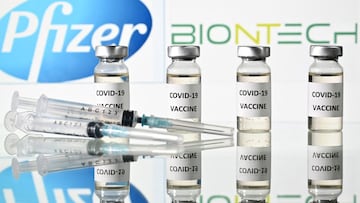Are the two doses of Pfizer more effective against the strains?
New research in the UK shows that in may be “critical” to get both shots of the Pfizer-BioNTech covid-19 vaccine to ensure protection against new variants.

Getting both doses of the two-dose covid-19 vaccines is the only way to ensure the recipient obtains the maximum efficacy, but researchers in the UK have found that it may be “critical” to provide protection against the emerging variants.
A new study published in the Lancet found that the Pfizer-BioNTech covid-19 vaccine had reduced effectiveness against variants of concern with the lowest against the Delta variant first discovered in India. The research team analyzed antibodies in the blood of healthy adults between the ages 33-52, up to 3 months after receiving their first dose of the Pfizer-BioNtech covid-19 vaccine.
Also see:
How effective is the Pfizer vaccine against the variants?
The researchers studied five variants, the original strain discovered in China, an un-named strain that was dominant in Europe during the first wave, the Alpha variant first seen in the UK, the Beta variant discovered in South Africa and the latest variant Delta which appeared in India.
Comparing the neutralizing antibody concentrations among the variants they found Pfizer-BioNTechs's vaccine worked to some extent against all five variants. People that had been fully vaccinated with Pfizer-BioTech had levels 2.6 times lower against the Alpha variant, 5 times lower against the Beta variant and 6 times lower against the Delta variant.
However, the antibody response was significantly lower with just one dose of the Pfizer-BioNTech vaccine against the Delta variant compared to the Alpha strain which is now the dominant strain in the US. In the lab experiment 79 percent of people had neutralizing antibodies against the original strain, dropping to 50 percent for the Alpha variant, 32 percent for the Beta variant, and 25 percent for the Delta variant.
Currently the Delta variant accounts for slightly more than one percent of sequenced cases in the US, according to the CDC.
“Important to look for real world data as it emerges”
Prof Deborah Dunn-Walters, Chair of the British Society for Immunology COVID-19 Taskforce said of the findings “It will be important to look for real world data as it emerges to determine the significance of this information.” Adding “This new information highlights the importance of monitoring emerging strains of the virus and how well the vaccines protect against them. At this time, it shows that two doses of vaccine are critical for protection.”
The researchers used a new laboratory system that had not previously been used in vaccine efficacy studies Prof Adam Finn, Professor of Paediatrics, University of Bristol pointed out in his statement on the results “We do not yet have a clear level of antibodies that accurately predicts protection even with the tests which we are more familiar with. Consequently, the exact importance of these results is uncertain.” Adding “Overall these results reinforce the importance of close surveillance of trends in this new variant and vaccine effectiveness over coming days and weeks.”






